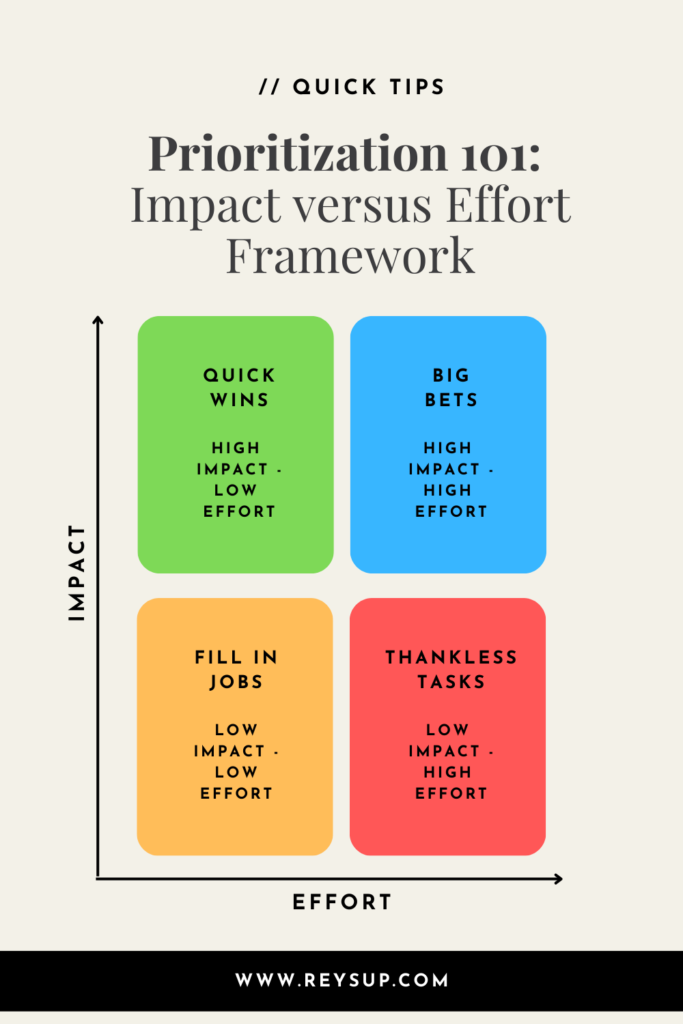This site contains affiliate links, view the disclosure for more information.
Expert strategies for when you are overwhelmed at work
Feeling overwhelmed at work is totally normal and very common. Especially in today’s fast-paced work environments, it’s very common to feel the pressure of deadlines, workload, and unrealistic expectations. In turn, these feelings can lead to stress and anxiety, which will eventually surface in the form of poor work performance. While it might feel isolating, it’s important to remember that everyone goes through this. Everyone faces moments when their responsibilities and circumstances seem too much to handle. The key is to recognize the triggers and put in place strategies to manage through these moments. In this article, we share expert strategies for when you are overwhelmed at work with tactical steps you can take starting today.

Why Do We Get Overwhelmed?
Before we get into the tactical strategies, we wanted to take a moment to explore the science behind feeling overwhelmed and why it happens in the first place.
There are several psychological theories out there that explain why people experience feelings of stress and get overwhelmed. One of the most common explanations is the Cognitive Load Theory. This theory suggests that human beings have a limited amount of cognitive capacity to process information at any given time, and when too much information is fed in, our brains struggle to process it all leaving us feeling very overwhelmed. This is why people tend to get stressed when they are multi-tasking, working to hit aggressive deadlines, dealing with personal issues outside of work, or juggling multiple priorities. There is a limit to how much we can do or handle at any given time and when we exceed that, our bodies try to tell us with these warning signs.
Now let’s get into the specifics around why we get overwhelmed. We will share a few common reasons, and with each provide some tactical steps you can take to overcome the situation.
1. Heavy Workload
Having a large workload is one of the main reasons employees feel overwhelmed. When you’re staring down a mountain of tasks or a never ending to-do list, it’s easy to freeze in the moment and not know where to begin.
Some tactical steps you can take:
- Break Tasks Down: Take large, daunting tasks that seem too big to handle and break them into smaller, more manageable parts. By doing this, you turn the overwhelming whole into actionable parts and tackle each part at a time.
- Prioritize: Instead of trying to do everything at once, identify the most important tasks by asking yourself what’s most critical to the success of the project or your job or what will drive the biggest impact. The impact vs effort matrix is helpful here as well. See the diagram below that explains how you can leverage this framework to categorize tasks to be done.

- Delegate: If possible, delegate some tasks to team mates or direct reports. Effective delegation helps reduce the load on your personal plate, allows you to dedicate more time to things that matter most, and even gives others the opportunity to contribute..
- Time Block: Set aside specific blocks of time for focused work. This method helps you concentrate on one task at a time and prevents distractions from creeping in.
2. Lack of Clear Priorities
Another reason why employees often get overwhelmed is because they don’t really understand their priorities. Not knowing where to focus your energy can lead a person to spiral and cause a ton of stress and anxiety.
Some tactical steps you can take:
- Over Communicate with Your Manager: If you’re stuck and unsure what tasks to prioritize, simply ask for help! Remember it is your manager’s job to provide clarity for you, and you shouldn’t ever feel bad about asking for additional guidance. A good manager would much prefer an employee to speak up about being stuck rather than silently struggling for extended periods of time.
- Set Personal Goals: If you can’t get clear direction from your leadership, try to define your own set of priorities instead based on your long-term goals. Work backwards by first identifying the end goal and then mapping out all the things that need to happen and the order in which they need to happen and start tackling them one by one.
- Use a Task Management System: Sometimes all it takes is a good project management system. You could use a free app (like Todoist) or even a simple hand-written to-do list in a notebook to organize and remind yourself of the priority of each task.
3. Poor Time Management
Time management is another common driver of stress and feeling overwhelmed. If you’re not managing your time effectively, it can feel like there aren’t enough hours in the day to get everything done.
Some tactical steps you can take:
- Set SMART Goals: Use SMART (Specific, Measurable, Achievable, Relevant, Time-bound) goals to plan your time better. This helps ensure that your tasks are focused and achievable. If you want to learn more about these types of goals, check out our other article on it here.
- Use the Pomodoro Method: Work in focused, 25-minute intervals with short breaks. This method is known to help people with productivity and task management. Here is a free timer for you to use if you want to give it a shot!
- Avoid Multitasking: Studies show that multitasking reduces efficiency. Focus on one task at a time and although it’s tempting, try not to move on to the next item on the list until you complete the one you are on entirely.
4. Inadequate Resources
This is a big one, especially in early stage companies that don’t have as much budget or defined processes. A lack of tools, training, or support can make anyone feel stuck and it often leads to frustration and anxiety.
Some tactical steps you can take:
- Make a Case for More Tools or Support: At ReysUp, we firmly believe that you should always ask for what you need to be successful. Worst case scenario is someone says no. Communicate with your manager or People Operations department if you don’t have the necessary resources to do your job. When you make asks, be as specific as you can about what you need, whether it’s better software, training, or additional staffing, and try to size the potential impact of having access to these additional tools so they can get a sense of ROI.
- Leverage Peer Support: If formal resources are lacking or not available, consider turning to your peers for help. Collaboration usually always helps. You never know. Perhaps someone else in the org was dealing with something similar and found a work around that you can also leverage.
5. Lack of Control
Feeling like you have no control over your work or destiny can lead to frustration. Whether it’s due to micromanagement or unrealistic expectations set by leadership, a lack of autonomy in your role is a surefire way to overwhelm someone and make them miserable.
Some tactical steps you can take:
- Communication Your Working Preferences: If you’re being micromanaged, no matter how uncomfortable it feels, it’s important that you voice your working preferences and provide the upward feedback to your manager. If you don’t know how to approach the conversation, consider saying something like: “I appreciate your guidance and support on our projects, but I feel I could be more effective if I had a bit more autonomy in my decision-making. Could we discuss ways I can take more ownership of my tasks while keeping you updated on my progress?”
- Negotiate Deadlines: If you’re facing unrealistic deadlines, have an honest conversation with your manager about timelines and workloads. Propose alternative deadlines or ask for additional resources to handle the workload.
- Focus on What You Can Control: At the end of the day, you can’t really change external factors, but you can control the actions you take personally. Focus your time on building better habits and personal processes so you still feel like you are in control of your career growth.
6. Poor Communication
Miscommunication or a lack of communication can lead to misunderstandings, missed deadlines, and, ultimately, stress. At ReysUp, we believe that detailed, over-communication is always the best approach.
Some tactical steps you can take:
- Ask for Clarification: If something is confusing or you are unsure of something, don’t hesitate to ask questions. It’s better to get clarity upfront than to waste time doing a task incorrectly.
- Get Important Details in Writing: After important discussions or meetings, remember to always summarize key points and decisions in writing. This not only reinforces your understanding of the situation, but it also provides a reference for future clarity and accountability.
- Host Regular Check-ins: Schedule weekly or bi-weekly check-ins with your manager or team to ensure everyone is on the same page, aware of deadlines, and communicating any potential blockers or challenges.
7. Personal Factors
Everyone has a life outside of work. And everyone deals with stress in life. Whether this stress is related to health, family, or other personal concerns, it can easily spill over into your work life and contribute to you feeling overwhelmed.
Some tactical steps you can take:
- Set Clear Boundaries Between Life and Work: Although this can be hard at times try to maintain a clear distinction between your personal life and work. This could mean setting specific work hours or turning off notifications after work to give yourself time to recharge and step away.
- Practice Self Care: Make sure you’re taking care of your physical and mental health! This stuff matters. Exercise regularly, get enough sleep, and consider practicing mindfulness techniques to manage your stress.
- Talk to HR: If personal issues are affecting your work, you might want to speak with HR or take advantage of employee assistance programs that offer counseling or other forms of support.
9. Fear of Failure
This is also colloquially known as ‘imposter syndrome’. The fear of making mistakes or being inadequate is such a normal human feeling, and there is no doubt that it can contribute to overwhelming stress.
Some tactical steps you can take:
- Try to Focus on Progress, Not Perfection: Shift your mindset from “I must achieve perfection” to “I want to get 1% better each day”. Set smaller, attainable goals to build your confidence over time.
- Learn from Mistakes: Everyone makes mistakes. It’s how we grow. Embrace these moments as learning opportunities. The more you accept that errors are part of growth, the less anxious you’ll feel about making them.
- Find a Mentor: Sometimes, hearing from someone who has been through similar challenges can put your fears into perspective and offer valuable advice.
In Summary
Feeling overwhelmed at work is totally normal. And while it can certainly feel debilitating in the moment, it’s important to remember that you are in control and that each source of stress has a practical solution. Our hope is that you can take some of the strategies shared in this post and start to reclaim control over your work and professional journey!




